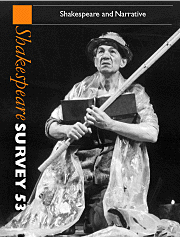Book contents
- Frontmatter
- Shakespeare’s Narremes
- Stepping Out of Narrative Line: A Bit of Word, and Horse, Play in Venus and Adonis
- A ‘consummation devoutly to be wished’: The Erotics of Narration in Venus and Adonis
- Echoes Inhabit a Garden: The Narratives of Romeo and Juliet
- A Midsummer Night’s Dream: Comedy as Apotrope of Myth
- Plutarch, Insurrection, and Dearth in Coriolanus
- Shakespeare, Crossing the Rubicon
- Vernacular Criticism and the Scenes Shakespeare Never Wrote
- The Shadow of Lear’s ‘Houseless’ in Dickens
- Shakespearian Margins in George Eliot’s ‘working-day world’
- In Her Father’s Library: Margaret Fuller and the Making of the American Miranda
- The Magician in Love
- Narrative Approaches to Shakespeare: Active Storytelling in Schools
- Monsters, Magicians, Movies: The Tempest and the Final Frontier
- Shakespeare’s Self-Repetitions and King John
- Inside Othello
- The View of London from the North and the Playhouses in Holywell
- Measured Endings: How Productions from 1720 to 1929 Close Shakespeare’s Open Silences in Measure for Measure
- Shakespearian Utopias
- Shakespeare Performances in England, 1999
- Professional Shakespeare Productions in the British Isles January–December 1998
- The Year's Contributions to Shakespearian Study 1 Critical Studies
- 2 Shakespeare’s Life, Times, and Stage
- 3 Editions and Textual Studies
- Books Received
- Index
Shakespeare, Crossing the Rubicon
Published online by Cambridge University Press: 28 March 2007
- Frontmatter
- Shakespeare’s Narremes
- Stepping Out of Narrative Line: A Bit of Word, and Horse, Play in Venus and Adonis
- A ‘consummation devoutly to be wished’: The Erotics of Narration in Venus and Adonis
- Echoes Inhabit a Garden: The Narratives of Romeo and Juliet
- A Midsummer Night’s Dream: Comedy as Apotrope of Myth
- Plutarch, Insurrection, and Dearth in Coriolanus
- Shakespeare, Crossing the Rubicon
- Vernacular Criticism and the Scenes Shakespeare Never Wrote
- The Shadow of Lear’s ‘Houseless’ in Dickens
- Shakespearian Margins in George Eliot’s ‘working-day world’
- In Her Father’s Library: Margaret Fuller and the Making of the American Miranda
- The Magician in Love
- Narrative Approaches to Shakespeare: Active Storytelling in Schools
- Monsters, Magicians, Movies: The Tempest and the Final Frontier
- Shakespeare’s Self-Repetitions and King John
- Inside Othello
- The View of London from the North and the Playhouses in Holywell
- Measured Endings: How Productions from 1720 to 1929 Close Shakespeare’s Open Silences in Measure for Measure
- Shakespearian Utopias
- Shakespeare Performances in England, 1999
- Professional Shakespeare Productions in the British Isles January–December 1998
- The Year's Contributions to Shakespearian Study 1 Critical Studies
- 2 Shakespeare’s Life, Times, and Stage
- 3 Editions and Textual Studies
- Books Received
- Index
Summary
What are historical representations representations of?
To paraphrase Hayden White, what are dramatic characters characterizations of? More specifically, how does the process of converting narrative material into dramatic form affect the shape and design, even the very concept, of character? The idea of character has fallen out of favour in the past two decades, as critics have instead pondered the birth and fashioning of subjectivity, in terms derived from Foucault and Lacan. Yet the lines demarcating the ideologically constructed, divided, and never selfauthorizing subject from the authorially constructed, conflicted, and never self-actualizing character have often seemed to be unclear, and their deployment more useful to the project of directing attention past the sovereign author than to that of understanding the complicated status of dramatized beings. Indeed, a critical era attuned to social constructionism has sometimes blurred the distinction between historical subjects, shaped by colliding ideological forces, and dramatic characters, subject on several dimensions to the same forces yet fundamentally different because of being the product of a dramatist's mind and an actor's embodiment.
In this essay I engage these issues by returning to the old question of Shakespeare's relation to the Plutarchan texts recognized as the primary sources of his Roman plays. Although Geoffrey Bullough's claim that source study presents a 'way open to us of watching Shakespeare the craftsman in his workshop' depends on notions of textual and authorial autonomy that would be difficult to support in our intertextual world, the basic recognition - that something important is happening in the passage between a clearly identified source and a later text - remains indisputable
- Type
- Chapter
- Information
- Shakespeare SurveyAn Annual Survey of Shakespeare Studies and Production, pp. 73 - 88Publisher: Cambridge University PressPrint publication year: 2000
- 9
- Cited by

